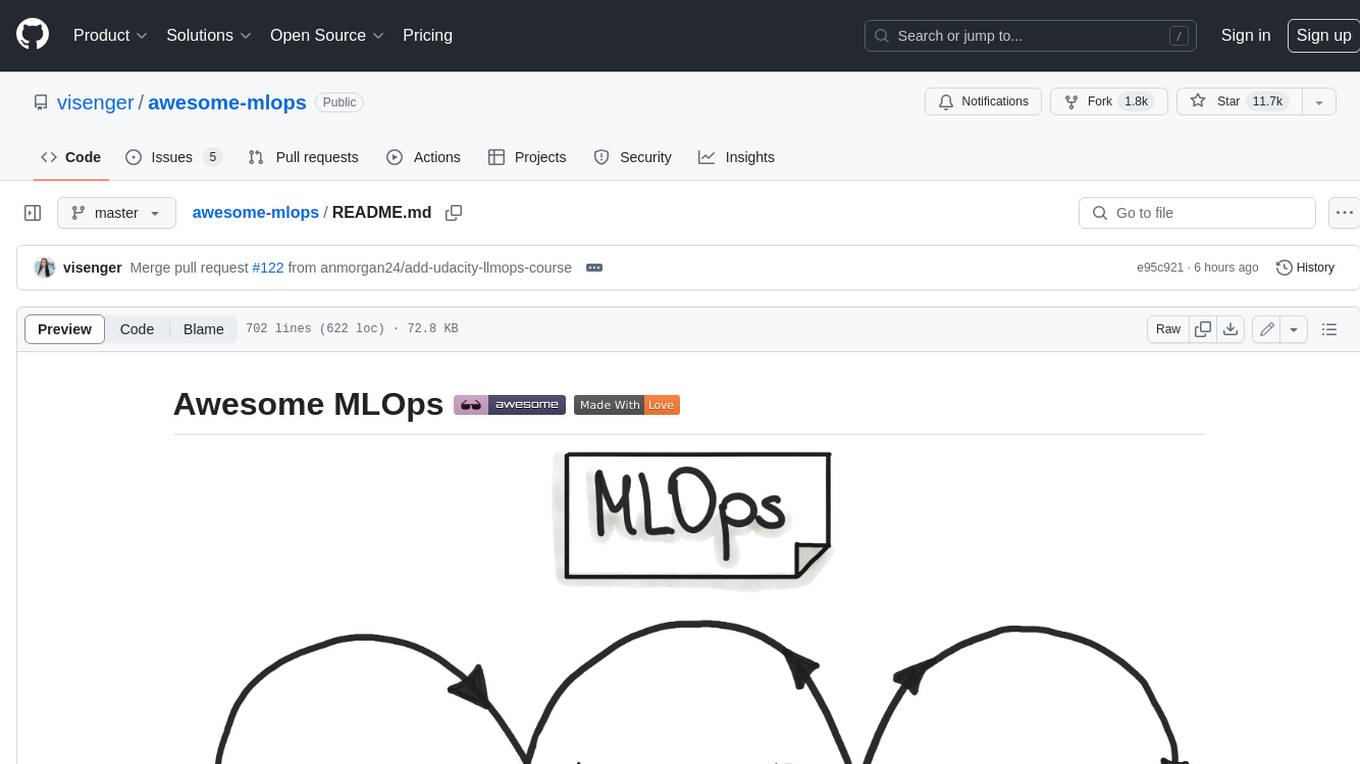
spring-ai-tutorial
None
Stars: 153
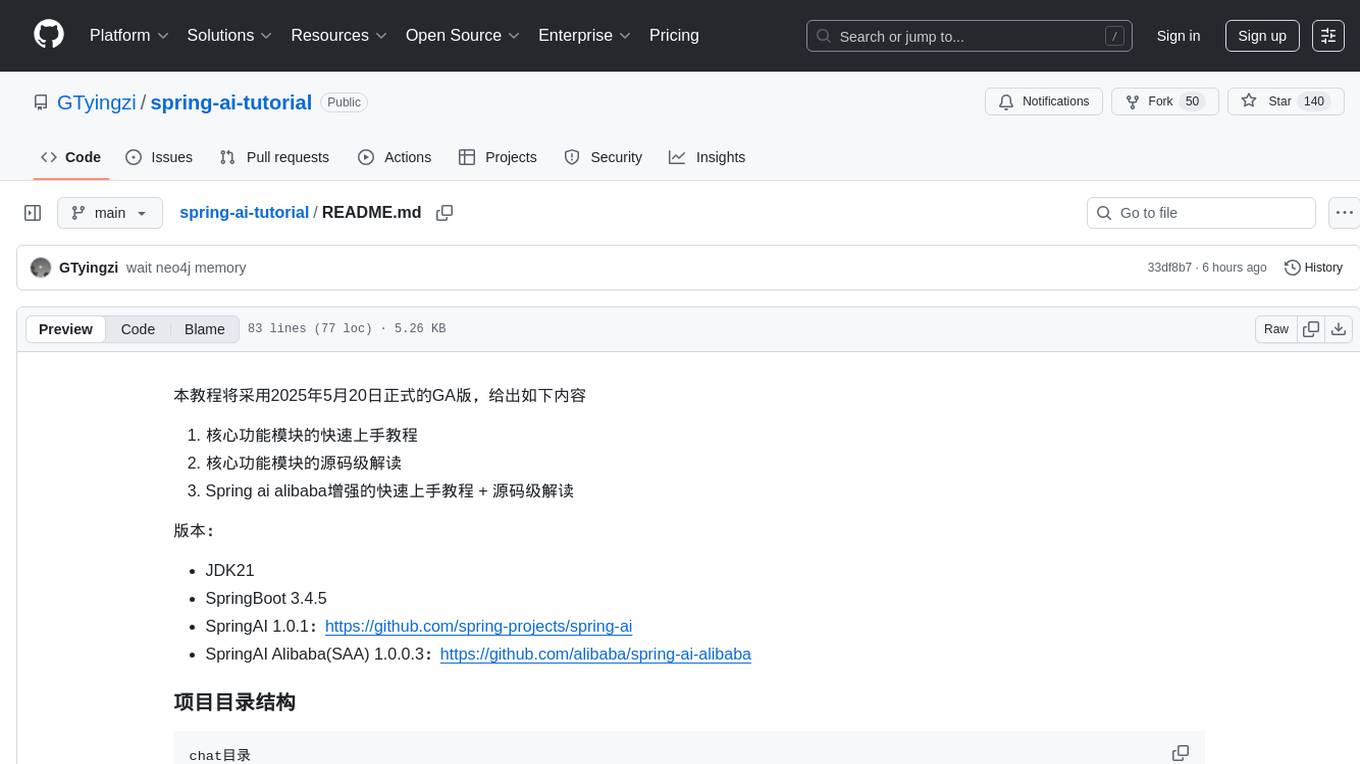
Spring AI Tutorial is a comprehensive guide for beginners to learn about integrating artificial intelligence capabilities into Spring Boot applications. The tutorial covers various AI concepts such as machine learning, natural language processing, and computer vision, and demonstrates how to implement them using popular AI libraries and tools within the Spring framework. By following this tutorial, users will gain a solid understanding of how to leverage AI technologies to enhance the functionality and intelligence of their Spring applications.
README:
本教程将采用2025年5月20日正式的GA版,给出如下内容
- 核心功能模块的快速上手教程
- 核心功能模块的源码级解读
- Spring ai alibaba增强的快速上手教程 + 源码级解读
版本:
- JDK21
- SpringBoot 3.4.5
- SpringAI 1.0.2:https://github.com/spring-projects/spring-ai
- SpringAI Alibaba(SAA) 1.0.0.4:https://github.com/alibaba/spring-ai-alibaba
chat目录
- alibaba-chat # 基于alibaba实现chat案例
- openai-chat # 基于openai实现chat案例
- deepseek-chat # 基于deepseek实现chat案例
- chat-setting # chat client的连接、请求时间设置
advisor目录
- advisor-base # advisor绑定内存记忆案例
- advisor-deep-think # 基于advisor的深度思考案例
- advisor-memory-sqlite # 基于sqlite的advisor绑定内存记忆案例
- advisor-memory-mysql # 基于mysql的advisor绑定内存记忆案例
- advisor-memory-redis # 基于redis的advisor绑定内存记忆案例
- advisor-memory-mem0 # 基于mem0的advisor绑定内存记忆案例
tool-calling # 时间、天气两个工具的Method版、Function版实现、internalToolExecutionEnabled、returnDirect设置
structured-output # map、list、实例对象类型的格式化输出案例
vector目录
- vector-simple # 基于内存的向量数据库案例
- vecotr-redis # 基于redis的向量数据库案例
- vector-elasticsearch # 基于ES的向量数据库案例
- vector-pgvector # 基于pgvector的向量数据库案例
- vector-neo4j # 基于neo4j的向量数据库案例
rag目录
- rag-simple # 基于内存的rag效果对比、模块化rag案例
- rag-etl-pipeline # 提取文档、转换文档、写出文档的案例
- rag-evaluation # 多模型评估,模型响应结果,结合RAG的案例
- rag-elasticsearch # 基于ES的rag案例
mcp目录
- client目录
- mcp-stdio-client # MCP的stdio客户端案例
- mcp-webflux-client # MCP的webflux客户端案例
- mcp-nacos3-client # MCP基于Nacos3.*实现分布式部署客户端案例
- mcp-auth-client # MCP基于请求头的授权客户端
- mcp-recovery-client # MCP的SSE连接断开,自动重连案例
- mcp-return-dirct-client # MCP的结果直接返回给客户端案例
- mcp-nacos-parse-swagger-server
- server目录
- mcp-stdio-server # MCP的stdio服务端案例
- mcp-webflux-server # MCP的webflux服务端案例
- mcp-nacos3-server # MCP基于Nacos3.*实现分布式部署服务端案例
- mcp-auth-server # MCP基于请求头的授权服务端-工具粒度
- mcp-auth-web-server # MCP基于请求头的授权服务端-粒度
- mcp-gateway-server # SAA的gateway服务零代码实现存量应用转换MCP案例
- mcp-nacos-parse-swagger-server(待补充) # MCP基于nacos动态解析swagger的restful服务端案例
ovservation目录
- observabilty # ObservationHandler下的client、model、tool、embedding的观测案例
- observability-langfuse # 基于langfuse的观测案例
graph目录 # 基于spring ai alibaba graph内核
- simple # 最简单的graph案例
- stream-node # 节点中AI模型的流式输出案例
- human-node # 流式返回结果,中断等待用户反馈,继续执行人类输入之后的工作案例
- paraller-node # 多节点并行的案例
- parallel-stream-node # 多节点并行的流式输出案例
- mcp-node # 配置指定mcp给指定node的案例
- observe-langfuse # 基于langfuse观测graph案例
agent目录
- react-agent # 基于时间工具的React Agent案例
- reflection-agent # 基于反思机制的Reflection Agent案例
other目录
- restful服务 # 提供接口调用服务,模拟存量接口
- nacos-swagger-restful(待补充) # 基于nacos+swagger的接口
- nacos-restful # 基于nacos3.*的接口
视频讲解地址:B站-视频讲解
微信推文系列:微信推文版
飞书云文档:飞书云文档版-最新教程
添加vx,备注交流,可加入交流群
For Tasks:
Click tags to check more tools for each tasksFor Jobs:
Alternative AI tools for spring-ai-tutorial
Similar Open Source Tools

spring-ai-tutorial
Spring AI Tutorial is a comprehensive guide for beginners to learn about integrating artificial intelligence capabilities into Spring Boot applications. The tutorial covers various AI concepts such as machine learning, natural language processing, and computer vision, and demonstrates how to implement them using popular AI libraries and tools within the Spring framework. By following this tutorial, users will gain a solid understanding of how to leverage AI technologies to enhance the functionality and intelligence of their Spring applications.
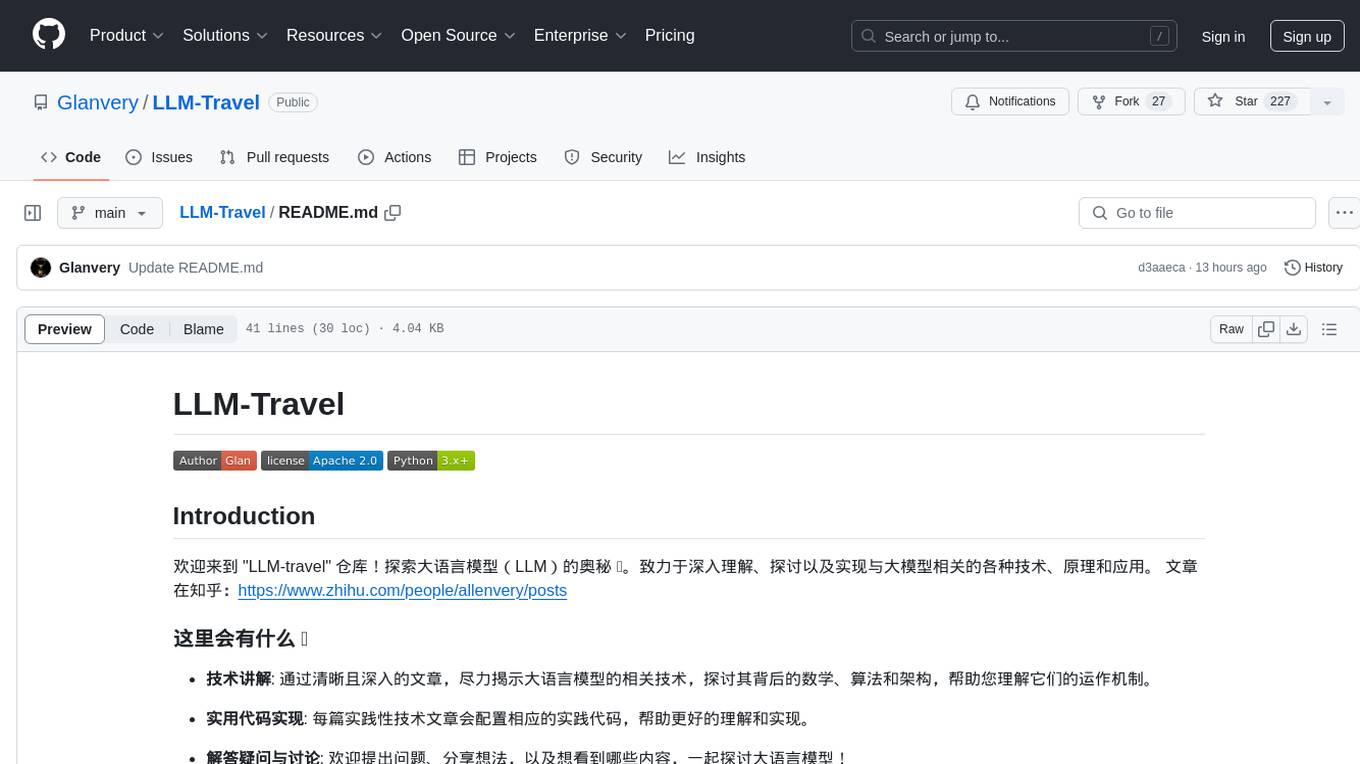
LLM-Travel
LLM-Travel is a repository dedicated to exploring the mysteries of Large Language Models (LLM). It provides in-depth technical explanations, practical code implementations, and a platform for discussions and questions related to LLM. Join the journey to explore the fascinating world of large language models with LLM-Travel.
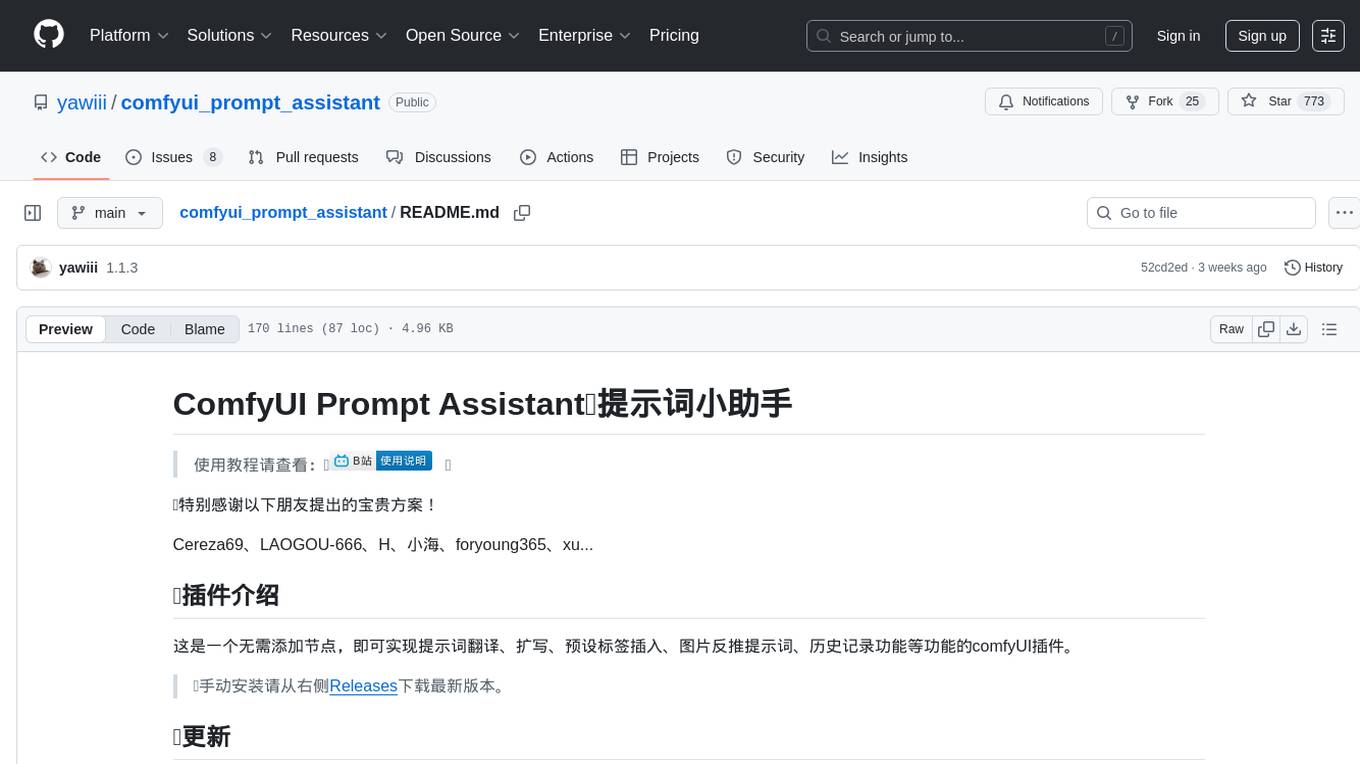
comfyui_prompt_assistant
ComfyUI Prompt Assistant is a plugin that enables prompt word translation, expansion, preset tag insertion, image reverse prompt words, and history record functions without adding nodes. It offers features like UI optimization, avoiding scroll bar overlap, tag popup window scrollbar fix, and more. Users can manually install the latest version from the Releases section. The tool supports various functionalities like image reverse, Kontext presets, translation nodes, and custom rules. It also provides features for tag insertion, LLM expansion, translation switching between Baidu and LLM, and history management.
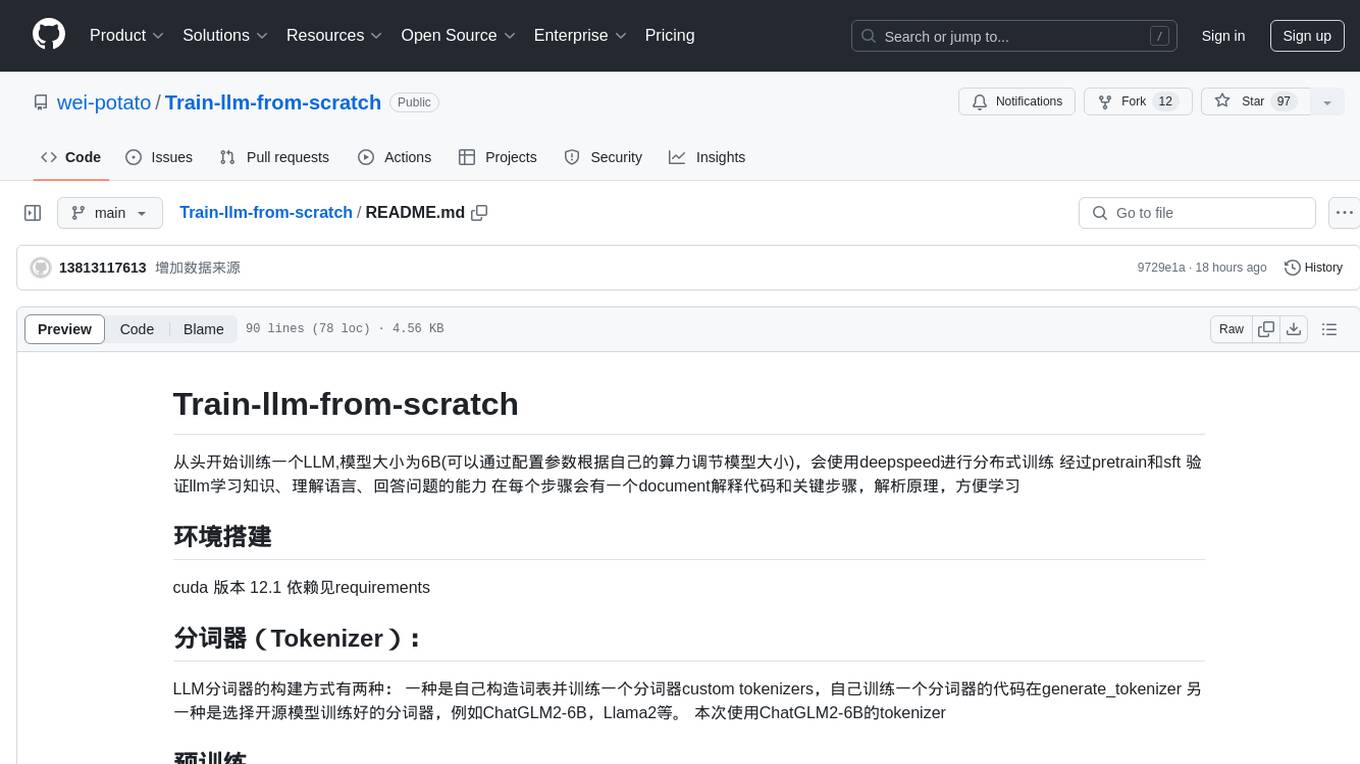
Train-llm-from-scratch
Train-llm-from-scratch is a repository that guides users through training a Large Language Model (LLM) from scratch. The model size can be adjusted based on available computing power. The repository utilizes deepspeed for distributed training and includes detailed explanations of the code and key steps at each stage to facilitate learning. Users can train their own tokenizer or use pre-trained tokenizers like ChatGLM2-6B. The repository provides information on preparing pre-training data, processing training data, and recommended SFT data for fine-tuning. It also references other projects and books related to LLM training.
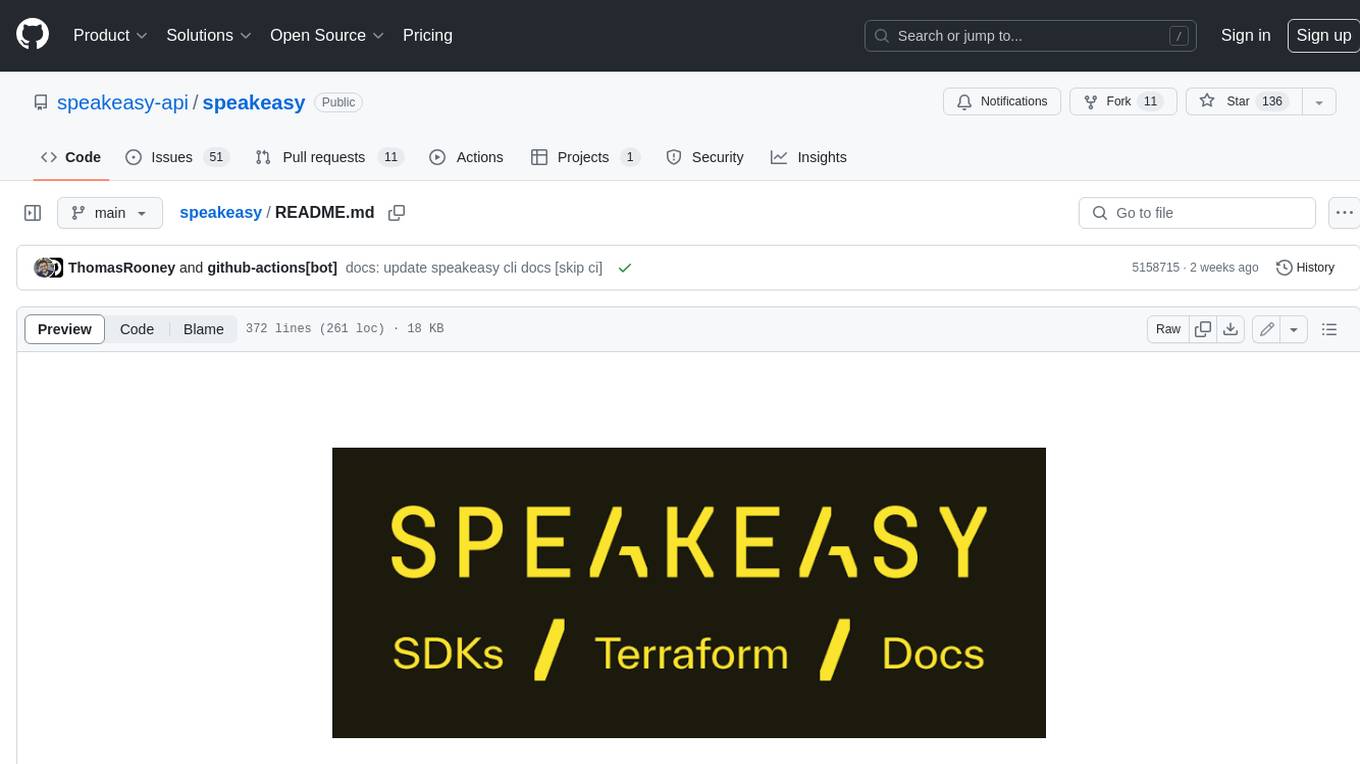
speakeasy
Speakeasy is a tool that helps developers create production-quality SDKs, Terraform providers, documentation, and more from OpenAPI specifications. It supports a wide range of languages, including Go, Python, TypeScript, Java, and C#, and provides features such as automatic maintenance, type safety, and fault tolerance. Speakeasy also integrates with popular package managers like npm, PyPI, Maven, and Terraform Registry for easy distribution.
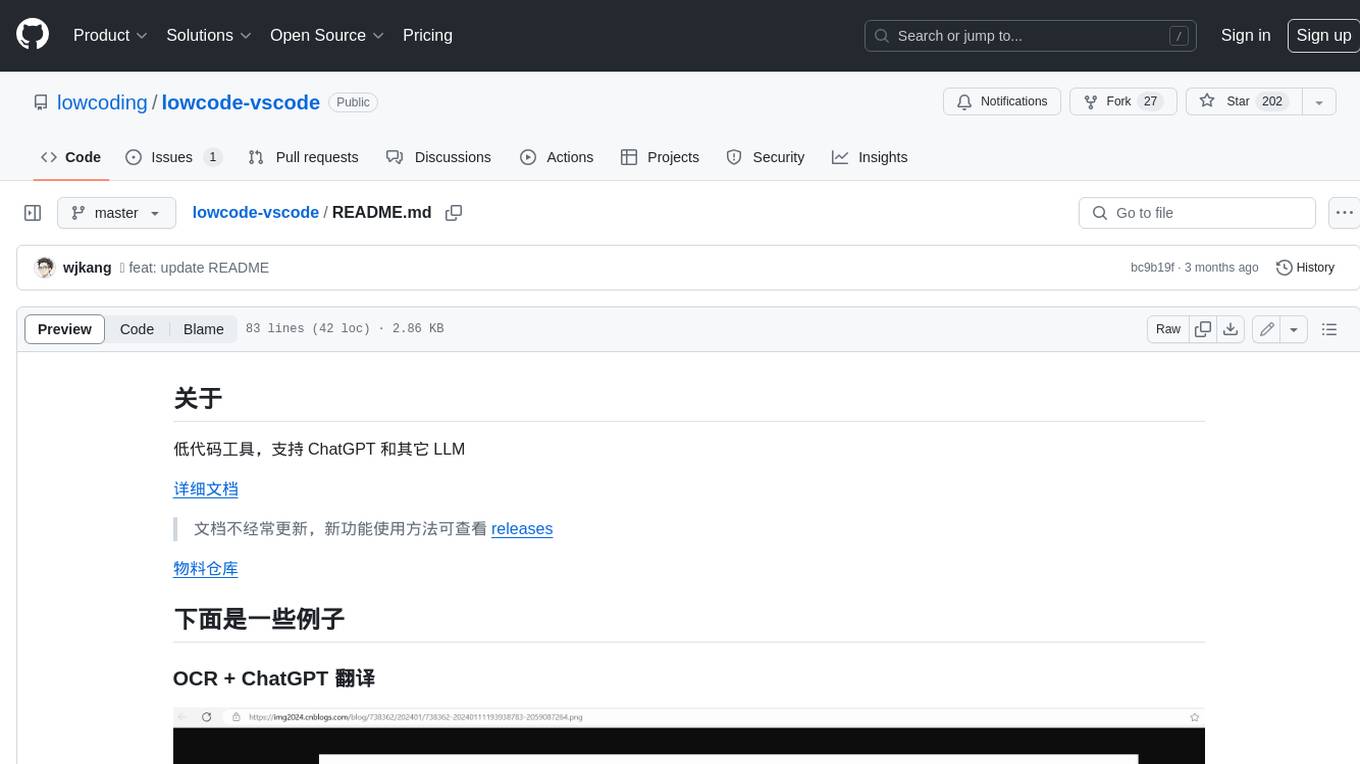
lowcode-vscode
This repository is a low-code tool that supports ChatGPT and other LLM models. It provides functionalities such as OCR translation, generating specified format JSON, translating Chinese to camel case, translating current directory to English, and quickly creating code templates. Users can also generate CURD operations for managing backend list pages. The tool allows users to select templates, initialize query form configurations using OCR, initialize table configurations using OCR, translate Chinese fields using ChatGPT, and generate code without writing a single line. It aims to enhance productivity by simplifying code generation and development processes.
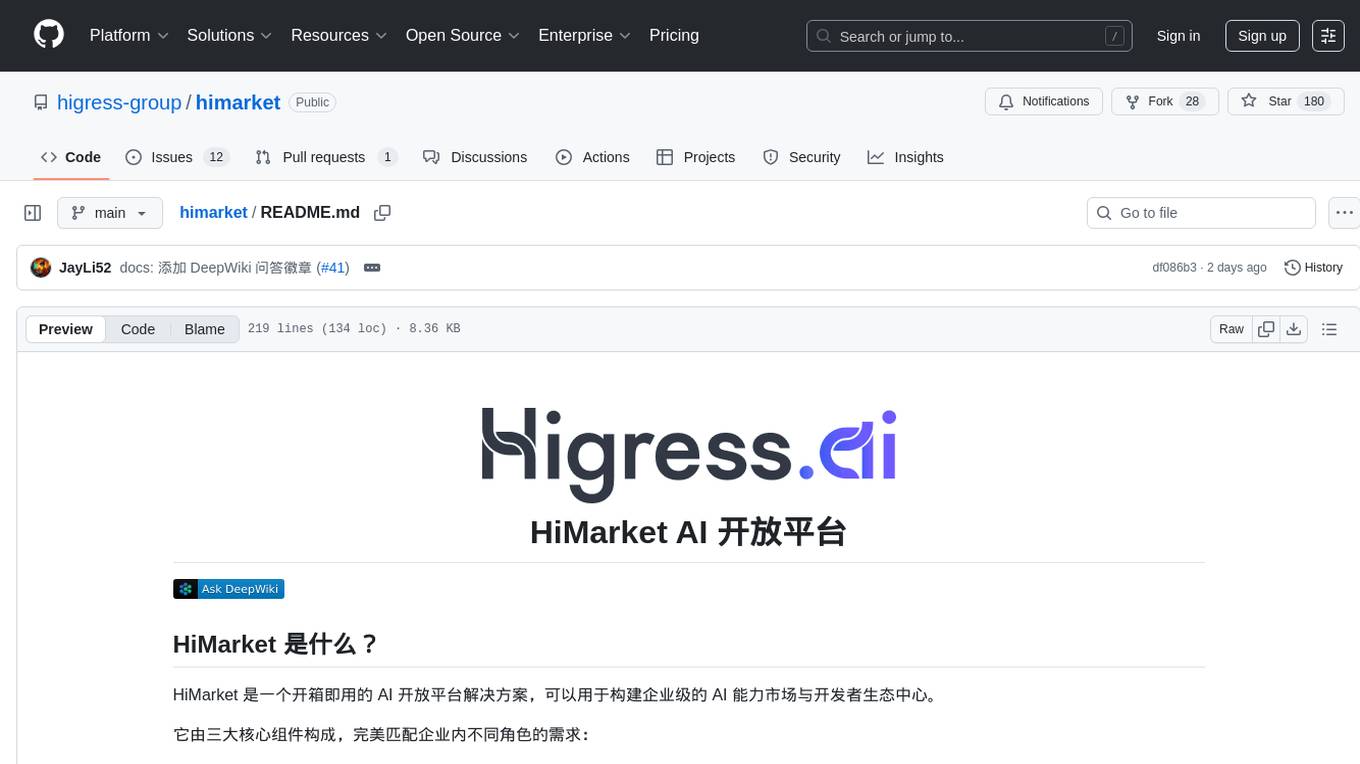
himarket
HiMarket is an out-of-the-box AI open platform solution that can be used to build enterprise-level AI capability markets and developer ecosystem centers. It consists of three core components tailored to different roles within the enterprise: 1. AI open platform management backend (for administrators/operators) for easy packaging of diverse AI capabilities such as model services, MCP Server, Agent, etc., into standardized 'AI products' in API form with comprehensive documentation and examples for one-click publishing to the portal. 2. AI open platform portal (for developers/internal users) as a 'storefront' for developers to complete registration, create consumers, obtain credentials, browse and subscribe to AI products, test online, and monitor their own call status and costs clearly. 3. AI Gateway: As a subproject of the Higress community, the Higress AI Gateway carries out all AI call authentication, security, flow control, protocol conversion, and observability capabilities.
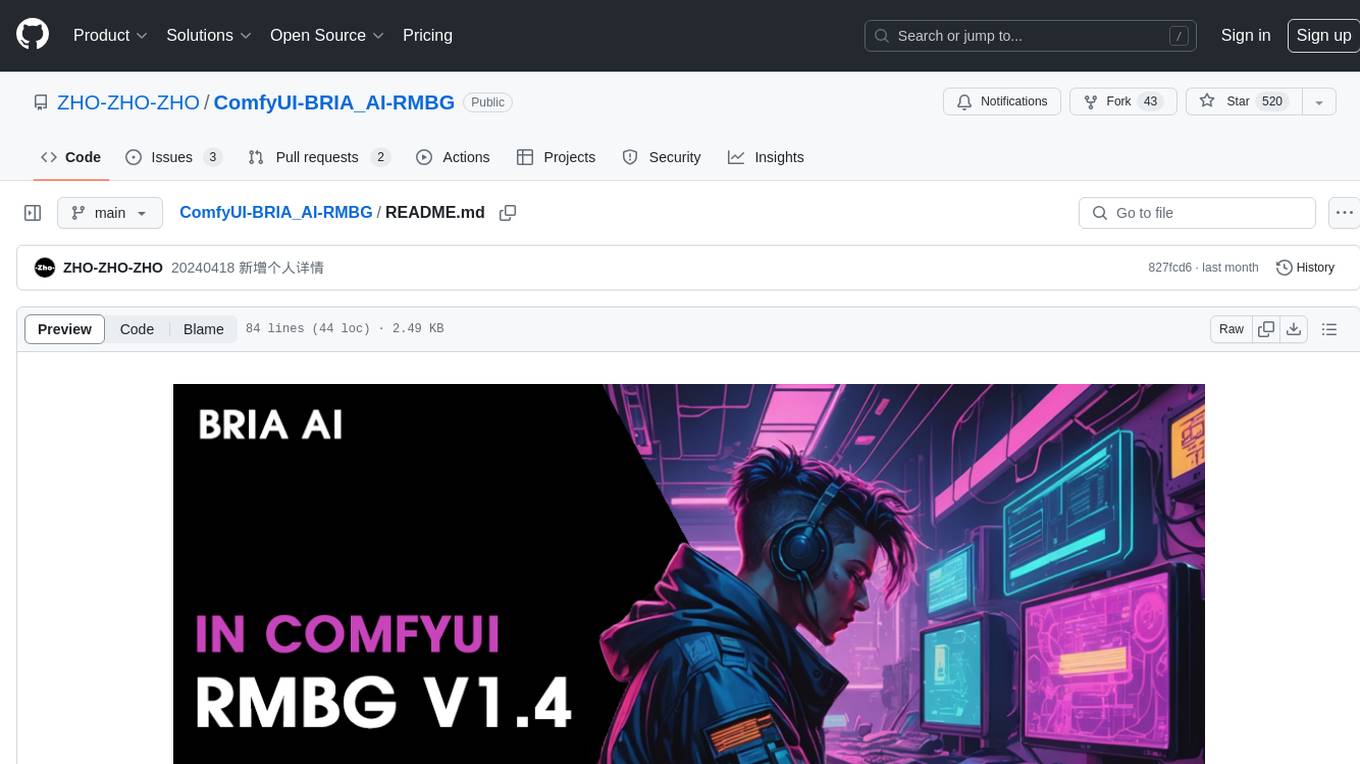
ComfyUI-BRIA_AI-RMBG
ComfyUI-BRIA_AI-RMBG is an unofficial implementation of the BRIA Background Removal v1.4 model for ComfyUI. The tool supports batch processing, including video background removal, and introduces a new mask output feature. Users can install the tool using ComfyUI Manager or manually by cloning the repository. The tool includes nodes for automatically loading the Removal v1.4 model and removing backgrounds. Updates include support for batch processing and the addition of a mask output feature.
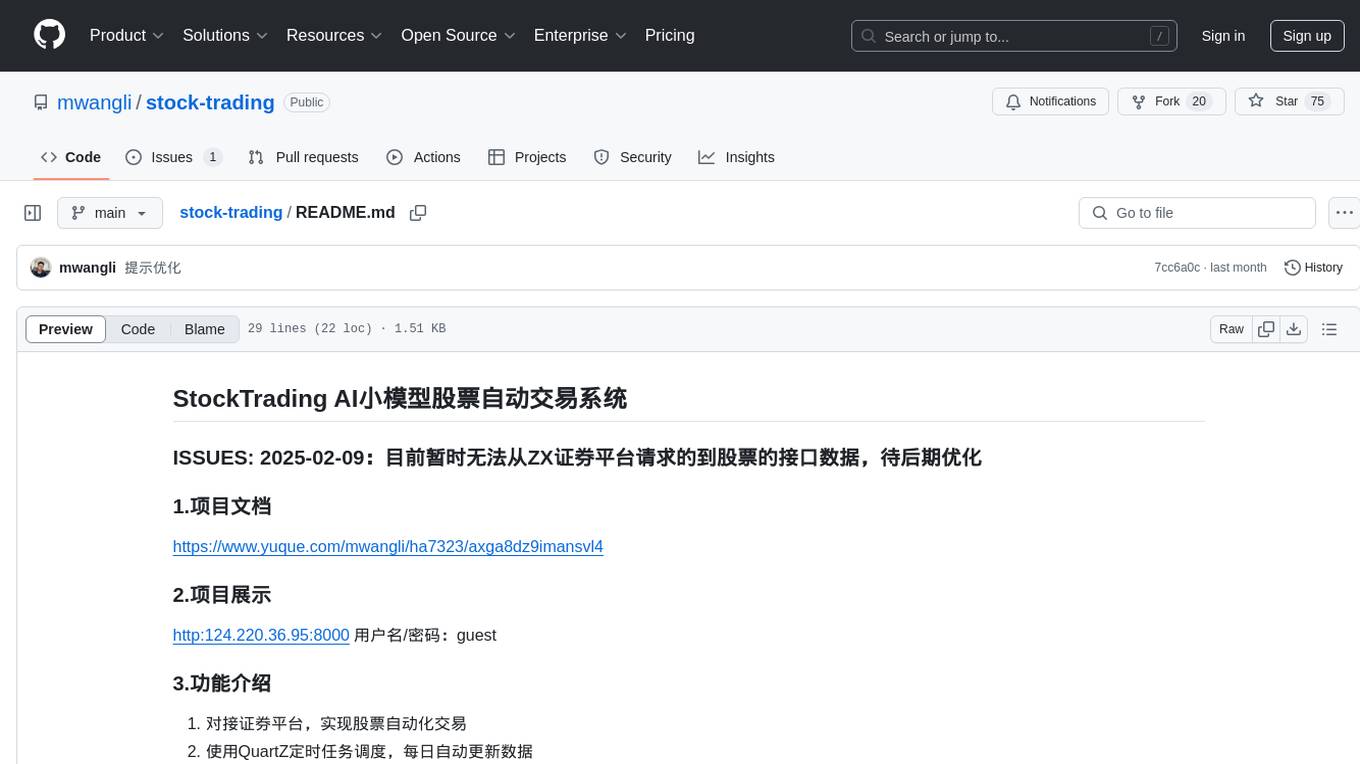
stock-trading
StockTrading AI is a small model stock automatic trading system that integrates with securities platforms, implements automated stock trading, utilizes QuartZ for scheduled tasks to update data daily, employs DL4J framework for LSTM model guidance on stock buying with T+1 short-term trading strategy, utilizes K8S+GithubAction for DevOps, and supports distributed offline training. Future optimizations include obtaining more historical stock data for incremental model training and tuning model hyperparameters to improve price trend prediction accuracy. The system provides various page displays for profit data statistics, trade order queries, stock price viewing, model prediction performance, scheduled task scheduling, and real-time log tracking.
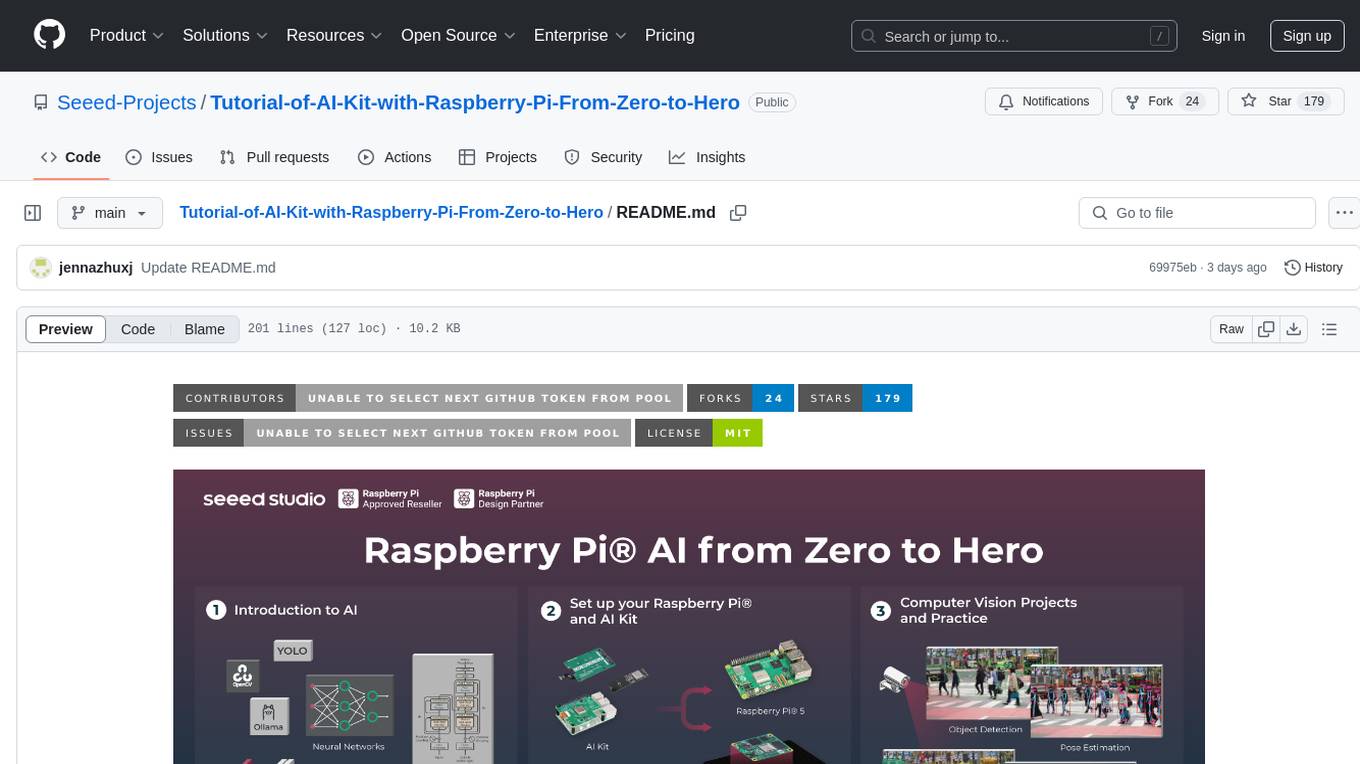
Tutorial-of-AI-Kit-with-Raspberry-Pi-From-Zero-to-Hero
This course is designed to teach you how to harness the power of AI on the Raspberry Pi, with a focus on using an AI kit for computer vision tasks. Learn to integrate AI into IoT applications, from object detection to visual recognition. Suitable for hobbyists, students, and professionals to bring AI-driven solutions to life on resource-constrained devices like the Raspberry Pi.
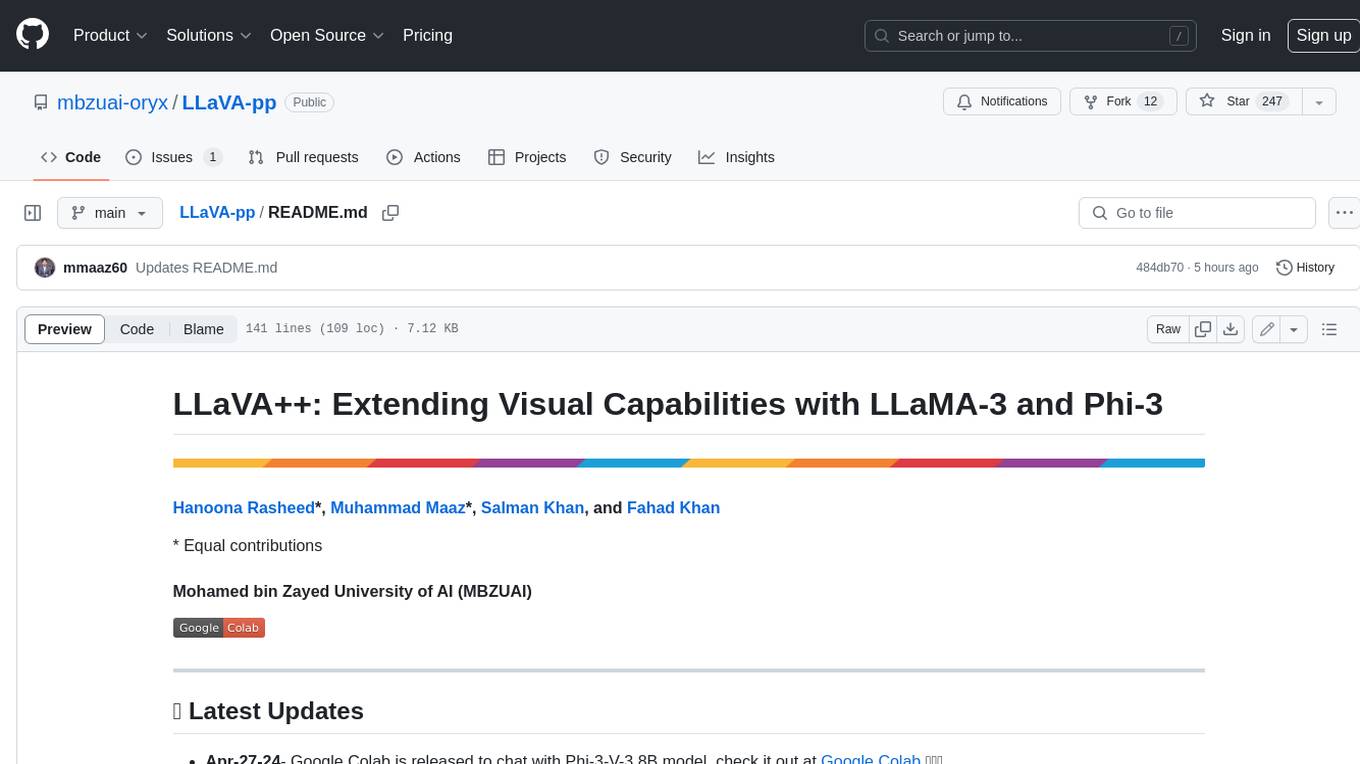
LLaVA-pp
This repository, LLaVA++, extends the visual capabilities of the LLaVA 1.5 model by incorporating the latest LLMs, Phi-3 Mini Instruct 3.8B, and LLaMA-3 Instruct 8B. It provides various models for instruction-following LMMS and academic-task-oriented datasets, along with training scripts for Phi-3-V and LLaMA-3-V. The repository also includes installation instructions and acknowledgments to related open-source contributions.
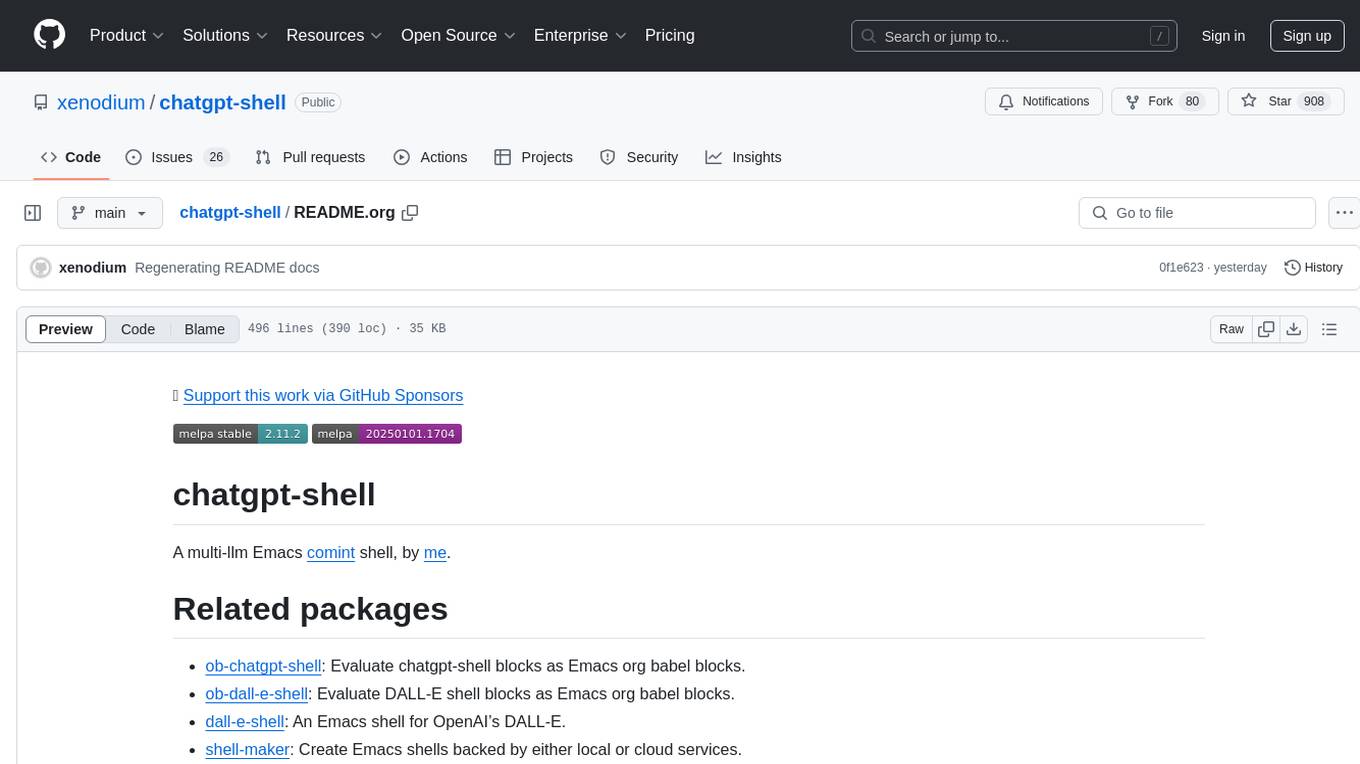
chatgpt-shell
chatgpt-shell is a multi-LLM Emacs shell that allows users to interact with various language models. Users can swap LLM providers, compose queries, execute source blocks, and perform vision experiments. The tool supports customization and offers features like inline modifications, executing snippets, and navigating source blocks. Users can support the project via GitHub Sponsors and contribute to feature requests and bug reports.
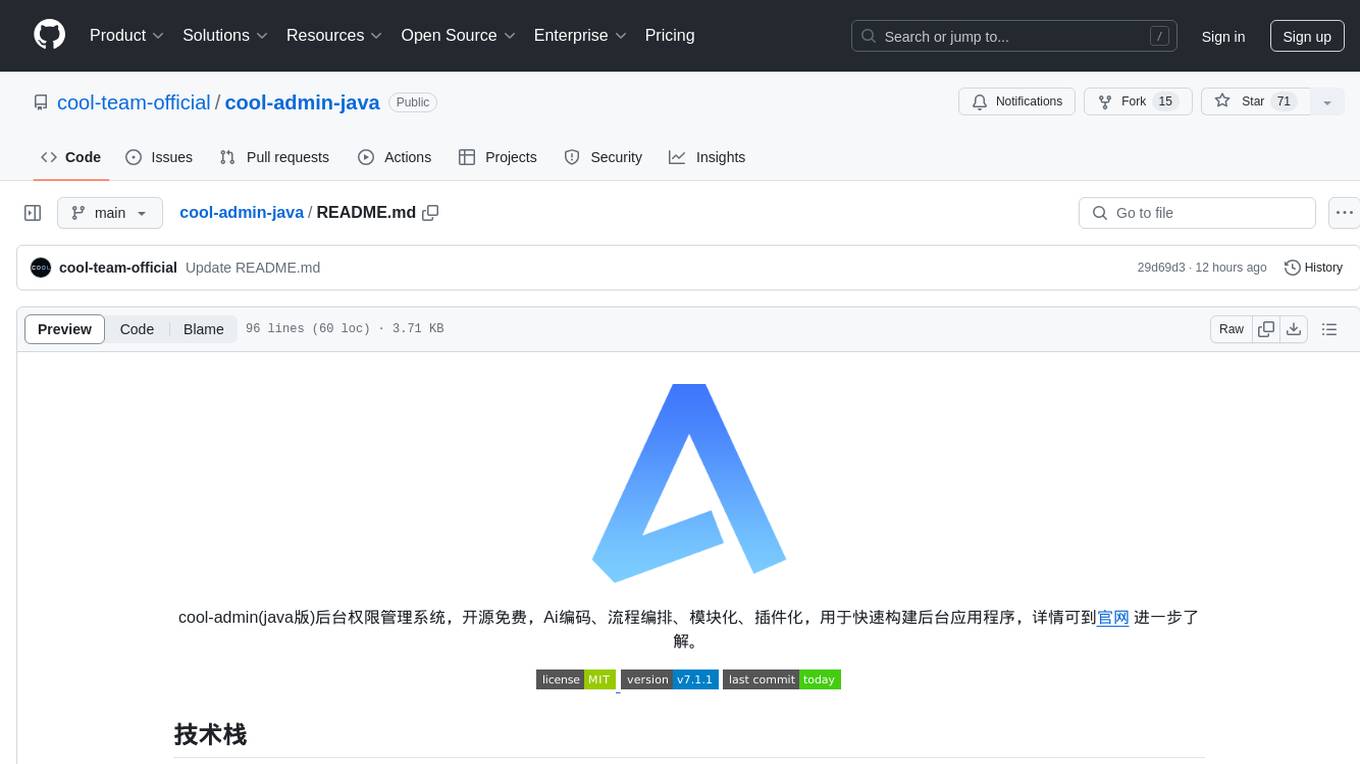
cool-admin-java
Cool-admin-java is an open-source backend permission management system with features like Ai coding, flow arrangement, modularity, and plugin support. It is used to quickly build backend applications. The system offers a modern development experience by providing functionalities such as one-click generation of API interfaces to frontend pages, drag-and-drop flow arrangement, modularized code for easy maintenance, and extensibility through plugin installation for features like payments, SMS, and emails.
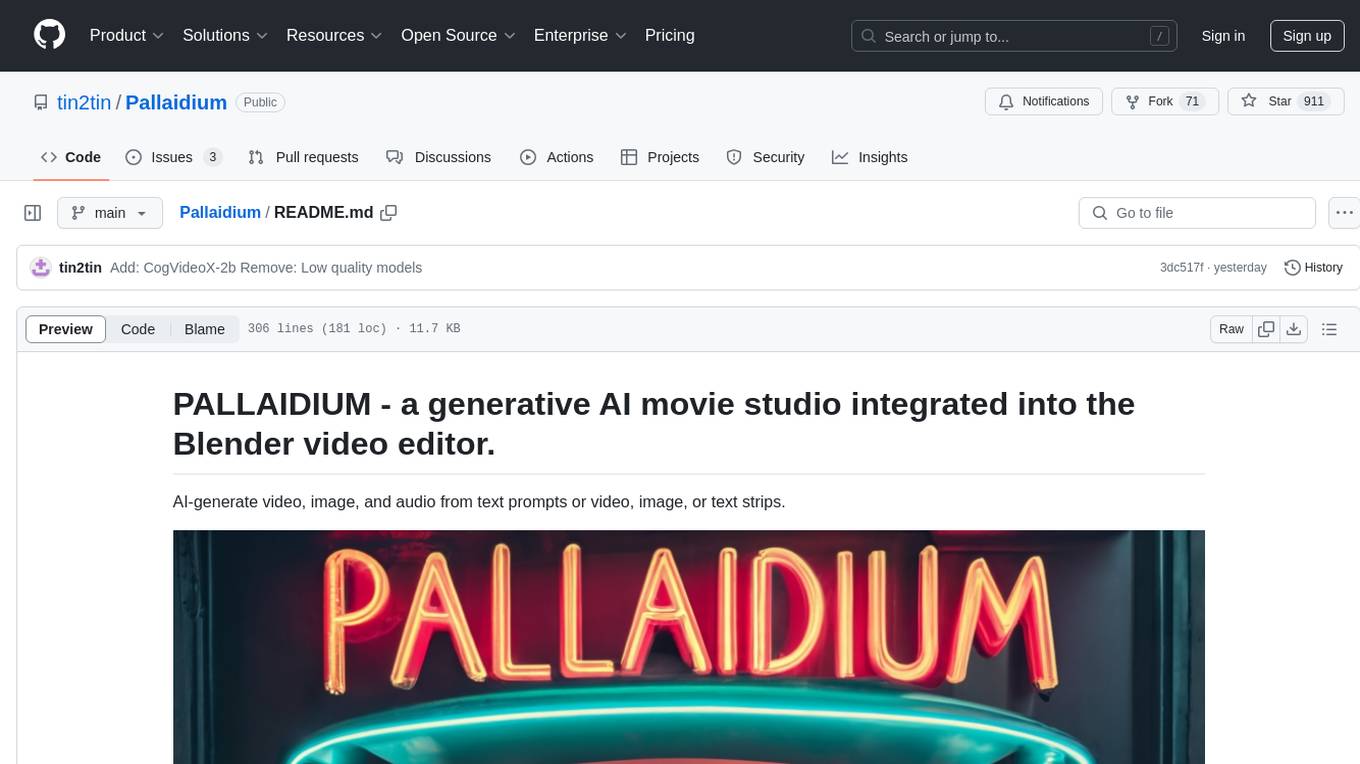
Pallaidium
Pallaidium is a generative AI movie studio integrated into the Blender video editor. It allows users to AI-generate video, image, and audio from text prompts or existing media files. The tool provides various features such as text to video, text to audio, text to speech, text to image, image to image, image to video, video to video, image to text, and more. It requires a Windows system with a CUDA-supported Nvidia card and at least 6 GB VRAM. Pallaidium offers batch processing capabilities, text to audio conversion using Bark, and various performance optimization tips. Users can install the tool by downloading the add-on and following the installation instructions provided. The tool comes with a set of restrictions on usage, prohibiting the generation of harmful, pornographic, violent, or false content.
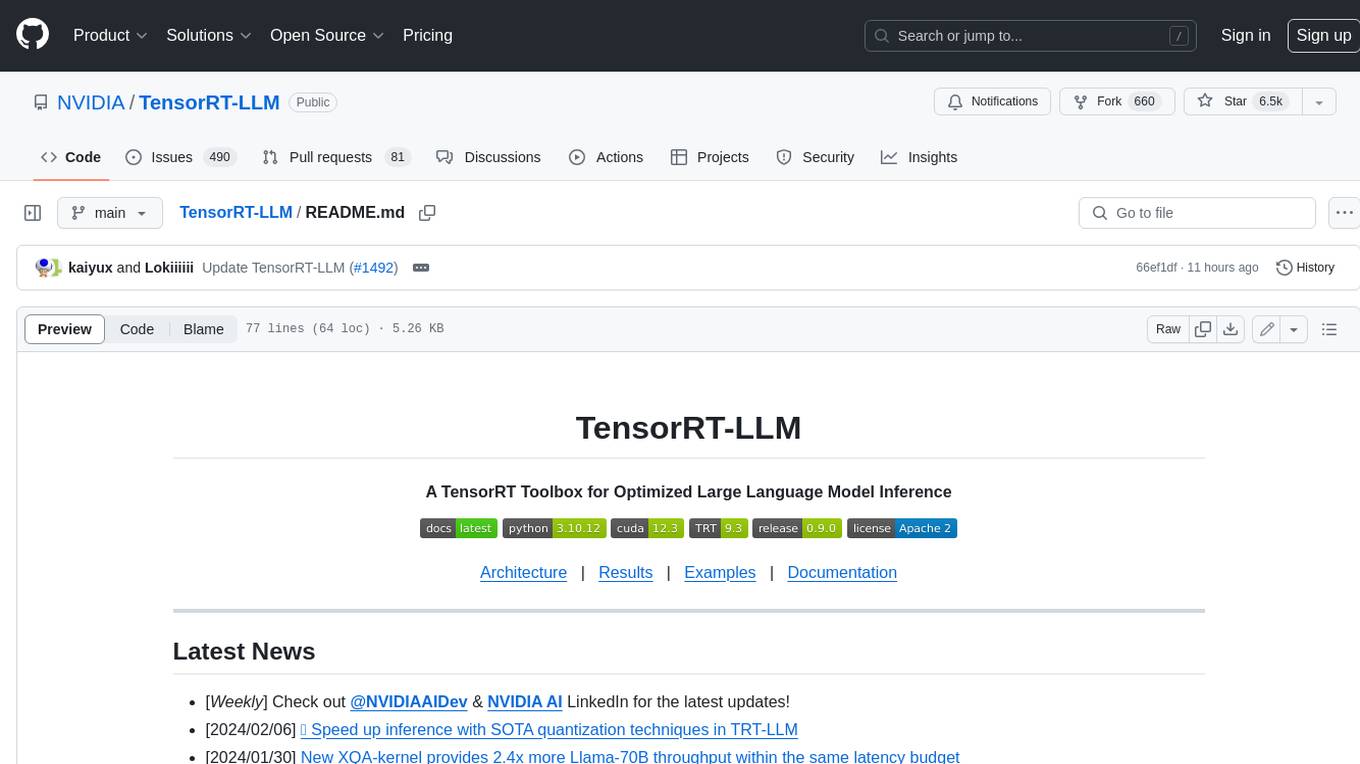
TensorRT-LLM
TensorRT-LLM is an easy-to-use Python API to define Large Language Models (LLMs) and build TensorRT engines that contain state-of-the-art optimizations to perform inference efficiently on NVIDIA GPUs. TensorRT-LLM contains components to create Python and C++ runtimes that execute those TensorRT engines. It also includes a backend for integration with the NVIDIA Triton Inference Server; a production-quality system to serve LLMs. Models built with TensorRT-LLM can be executed on a wide range of configurations going from a single GPU to multiple nodes with multiple GPUs (using Tensor Parallelism and/or Pipeline Parallelism).
For similar tasks

Azure-Analytics-and-AI-Engagement
The Azure-Analytics-and-AI-Engagement repository provides packaged Industry Scenario DREAM Demos with ARM templates (Containing a demo web application, Power BI reports, Synapse resources, AML Notebooks etc.) that can be deployed in a customer’s subscription using the CAPE tool within a matter of few hours. Partners can also deploy DREAM Demos in their own subscriptions using DPoC.

sorrentum
Sorrentum is an open-source project that aims to combine open-source development, startups, and brilliant students to build machine learning, AI, and Web3 / DeFi protocols geared towards finance and economics. The project provides opportunities for internships, research assistantships, and development grants, as well as the chance to work on cutting-edge problems, learn about startups, write academic papers, and get internships and full-time positions at companies working on Sorrentum applications.

tidb
TiDB is an open-source distributed SQL database that supports Hybrid Transactional and Analytical Processing (HTAP) workloads. It is MySQL compatible and features horizontal scalability, strong consistency, and high availability.

zep-python
Zep is an open-source platform for building and deploying large language model (LLM) applications. It provides a suite of tools and services that make it easy to integrate LLMs into your applications, including chat history memory, embedding, vector search, and data enrichment. Zep is designed to be scalable, reliable, and easy to use, making it a great choice for developers who want to build LLM-powered applications quickly and easily.

telemetry-airflow
This repository codifies the Airflow cluster that is deployed at workflow.telemetry.mozilla.org (behind SSO) and commonly referred to as "WTMO" or simply "Airflow". Some links relevant to users and developers of WTMO: * The `dags` directory in this repository contains some custom DAG definitions * Many of the DAGs registered with WTMO don't live in this repository, but are instead generated from ETL task definitions in bigquery-etl * The Data SRE team maintains a WTMO Developer Guide (behind SSO)

mojo
Mojo is a new programming language that bridges the gap between research and production by combining Python syntax and ecosystem with systems programming and metaprogramming features. Mojo is still young, but it is designed to become a superset of Python over time.

pandas-ai
PandasAI is a Python library that makes it easy to ask questions to your data in natural language. It helps you to explore, clean, and analyze your data using generative AI.

databend
Databend is an open-source cloud data warehouse that serves as a cost-effective alternative to Snowflake. With its focus on fast query execution and data ingestion, it's designed for complex analysis of the world's largest datasets.
For similar jobs

sweep
Sweep is an AI junior developer that turns bugs and feature requests into code changes. It automatically handles developer experience improvements like adding type hints and improving test coverage.

teams-ai
The Teams AI Library is a software development kit (SDK) that helps developers create bots that can interact with Teams and Microsoft 365 applications. It is built on top of the Bot Framework SDK and simplifies the process of developing bots that interact with Teams' artificial intelligence capabilities. The SDK is available for JavaScript/TypeScript, .NET, and Python.

ai-guide
This guide is dedicated to Large Language Models (LLMs) that you can run on your home computer. It assumes your PC is a lower-end, non-gaming setup.

classifai
Supercharge WordPress Content Workflows and Engagement with Artificial Intelligence. Tap into leading cloud-based services like OpenAI, Microsoft Azure AI, Google Gemini and IBM Watson to augment your WordPress-powered websites. Publish content faster while improving SEO performance and increasing audience engagement. ClassifAI integrates Artificial Intelligence and Machine Learning technologies to lighten your workload and eliminate tedious tasks, giving you more time to create original content that matters.

chatbot-ui
Chatbot UI is an open-source AI chat app that allows users to create and deploy their own AI chatbots. It is easy to use and can be customized to fit any need. Chatbot UI is perfect for businesses, developers, and anyone who wants to create a chatbot.

BricksLLM
BricksLLM is a cloud native AI gateway written in Go. Currently, it provides native support for OpenAI, Anthropic, Azure OpenAI and vLLM. BricksLLM aims to provide enterprise level infrastructure that can power any LLM production use cases. Here are some use cases for BricksLLM: * Set LLM usage limits for users on different pricing tiers * Track LLM usage on a per user and per organization basis * Block or redact requests containing PIIs * Improve LLM reliability with failovers, retries and caching * Distribute API keys with rate limits and cost limits for internal development/production use cases * Distribute API keys with rate limits and cost limits for students

uAgents
uAgents is a Python library developed by Fetch.ai that allows for the creation of autonomous AI agents. These agents can perform various tasks on a schedule or take action on various events. uAgents are easy to create and manage, and they are connected to a fast-growing network of other uAgents. They are also secure, with cryptographically secured messages and wallets.

griptape
Griptape is a modular Python framework for building AI-powered applications that securely connect to your enterprise data and APIs. It offers developers the ability to maintain control and flexibility at every step. Griptape's core components include Structures (Agents, Pipelines, and Workflows), Tasks, Tools, Memory (Conversation Memory, Task Memory, and Meta Memory), Drivers (Prompt and Embedding Drivers, Vector Store Drivers, Image Generation Drivers, Image Query Drivers, SQL Drivers, Web Scraper Drivers, and Conversation Memory Drivers), Engines (Query Engines, Extraction Engines, Summary Engines, Image Generation Engines, and Image Query Engines), and additional components (Rulesets, Loaders, Artifacts, Chunkers, and Tokenizers). Griptape enables developers to create AI-powered applications with ease and efficiency.

